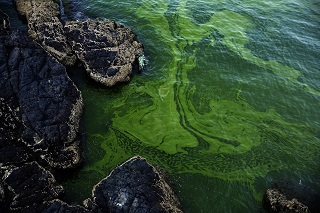The Arabian Sea: Poster Child for Environmental Disaster

Another cause, somehow overlooked by the author, is the literal river of manure and urine pouring in from the largest and most densely packed farm for contained animals, the 400,000 buffaloes that provide almost all the meat and dairy products for the 23.6 million people in Karachi, Pakistan’s largest city, and the 7th largest city in the world. (The mitigation of this horrific scene is one of my favorite cleantech investment opportunities.)
Here’s a line from the article that would be funny if it weren’t so tragic: “We know that our Earth is changing,” (a top scientist) said. “It may be in a direction we might not like.”
Really? Who woulda thunk it?
Check it out, folks. This is what environmental deregulation looks like.

Craig,
Thank you for raising such an important topic.
The oceans of the world are overlooked by most people when it comes to environmental management.
On of the problems is national jurisdictions, and no jurisdiction.
Algal blooms are just one of a host of environmental problems inflicted upon the oceans by human activity. Unfortunately, many of the more urgent problems are passed off by environmental advocates as “climate change’ or “global warming”, and as a result less politically rewarding explanations are ignored or overlooked.
You quite rightly point to the effects of effluent, fertilizer runoff, changes in agriculture, sea walls, land reclamation projects,excessive fishing, non bio degradable plastics, bunker oil pollution and generally treating the ocean as a garbage dump.
The interconnectedness and interdependence of oceanic life and environment is little understood or of no concern to most people and national organizations.
While everyone expresses great concern, in reality most governments see few votes in tackling oceanic pollution, while most environmental advocates also find the subject less rewarding than more politically charged topics, so the oceans get ignored.
Worse still is the very superficial, emotive and just plain wrong, media coverage. Media, and media ‘celebrities’, arrive at a marine location with an already preconceived agenda, make a picturesque, but totally inaccurate report, then depart.
Meanwhile, underfunded, understaffed, underpaid marine biologist, scientists and researchers are left feeling frustrated.
I’m not sure what can be done to rectify the situation, but your efforts to raise awareness is very commendable.